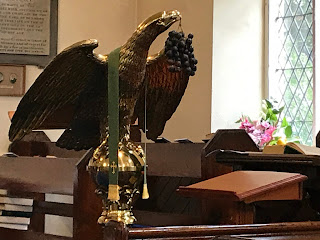Yesterday I had lunch with my youngest son, along with his wife Louise
and their gorgeous daughter Carys. The food was superb, and hugely authentic –
we ate at the Hispi (Didsbury) restaurant. If you are in Manchester for any
reason, give it a go. Food has been on my mind this past week. Last Sunday I
went to a Harvest Festival service in a small church known as ‘Ashworth Chapel’.
It’s a church with a long history, originally built in 1514, and it stands on
top of a hill amid the rolling moors surrounding Rochdale. I like it, partly
for the history each stone represents, but also for the quiet and calm feeling sitting
inside brings. The services are mainly from the Book of Common Prayer, which, in
an age of digital everything, may not be to every ones taste. The church was decorated with flowers and
symbols of the harvest, very much as I remember from my childhood. Some wag had
even hung a bunch of grapes from the eagle lectern.
I think it must have been in my childhood that I last sang
the rousing hymn ‘We Plough the Fields and Scatter’. Apparently, it is one of
the most performed hymns in the UK. One week later, and I am still singing the first
verse and chorus. It’s a very infectious tune and I dare you to click on this link and see if the music and words don’t also stay with you for a while. The
Harvest Festival service is primarily about taking the opportunity to say ‘thank
you’, for the food we enjoy, for those that farm, produce, prepare and make available
the results of their labour to the rest of us.
The service is also an opportunity to remember and respond to
those who don’t have enough food or other basic necessities. Gifts of food were
brought to the chapel and then distributed to those in need during the week. For
me seeing the children and families bring their boxes and carry bags of food to
the front of the church was a poignant glimpse back to my childhood when my parents
encouraged my brothers and sisters and I to do the same thing. And last week I
was privileged to enjoy a glimpse back to the work of my friend and colleague
Professor Maxine Power. Maxine is currently the CEO of the fabulous innovation
and improvement science centre known as HAELO – an organisation that the
University of Salford has been proud to be a partner with. Last week, I joined
many others who have been part of Maxine’s journey of discovery and achievement,
to say thank you and to wish her well in her new role.
Maxine is leaving HAELO to join the North West Ambulance Service
as their Director of Quality Improvement. Although she will be greatly missed
by many working in health and social care services across Greater Manchester,
this is an opportunity for her talents to be brought to bear across the whole
of the North West of England. The emergency services in the UK, including the
ambulance service, are having to change to meet the increasingly complex world
of health and social care. They need to do so in a way that uses the advantages new technologies, might bring to improving the services individuals receive
when they most need them. Maxine reminded us all of the opening words of the NHS Constitution:
The NHS belongs to the people
It is there to improve our health and wellbeing, supporting us
to keep mentally and physical well, to get better when we are ill and, when we
cannot fully recover, to stay as well as we can to the end of our lives. It
works at the limits of science – bringing the highest levels of human knowledge
and skill to save lives and improve health. It touches our lives at times of basic
human need, when care and compassion are what matter most.
Regular readers of this blog will know that I am a big fan of
the NHS and of what collectively, we have been able to achieve in tackling disease,
treating illness and responding to trauma. It was great to read last week that
the UK has joined other countries within the European Region in eliminating
Measles. Measles is a highly contagious, serious disease caused by a virus. The
disease remains one of the leading causes of death among young children
globally, despite there being a safe and cost-effective vaccine available. It’s
estimated that during 2000 – 2015, measles vacation prevented up to 20.3 million
deaths. That the UK has eliminated this disease demonstrates the effectiveness of
such a vaccination programme. I have grown to like and appreciate the value of tradition,
but increasingly I also see the need to embrace change where this is appropriate
to do so. And Joe, think about this for the next time we go to Hisbis for a meal and the bill comes.



No comments:
Post a Comment